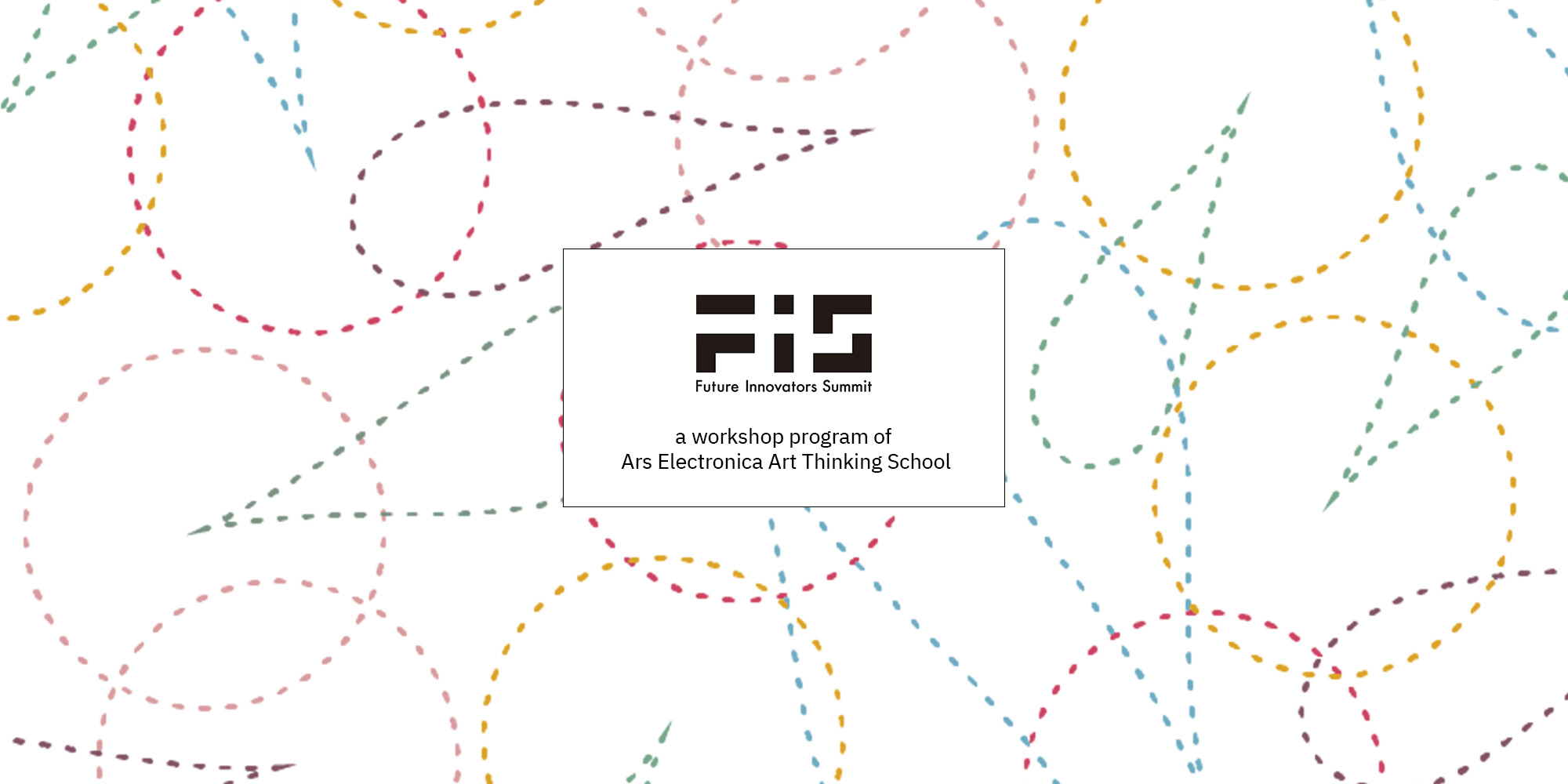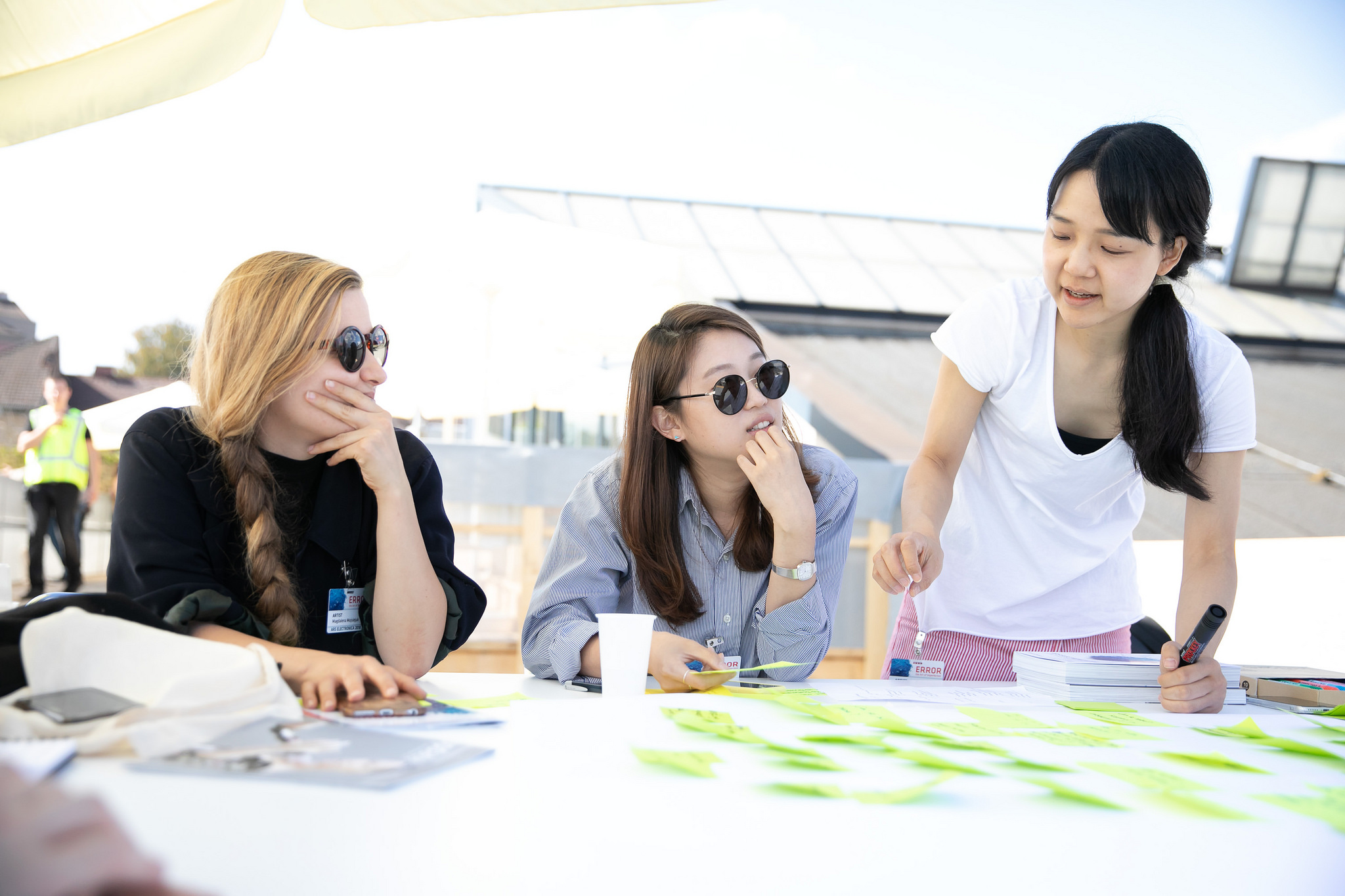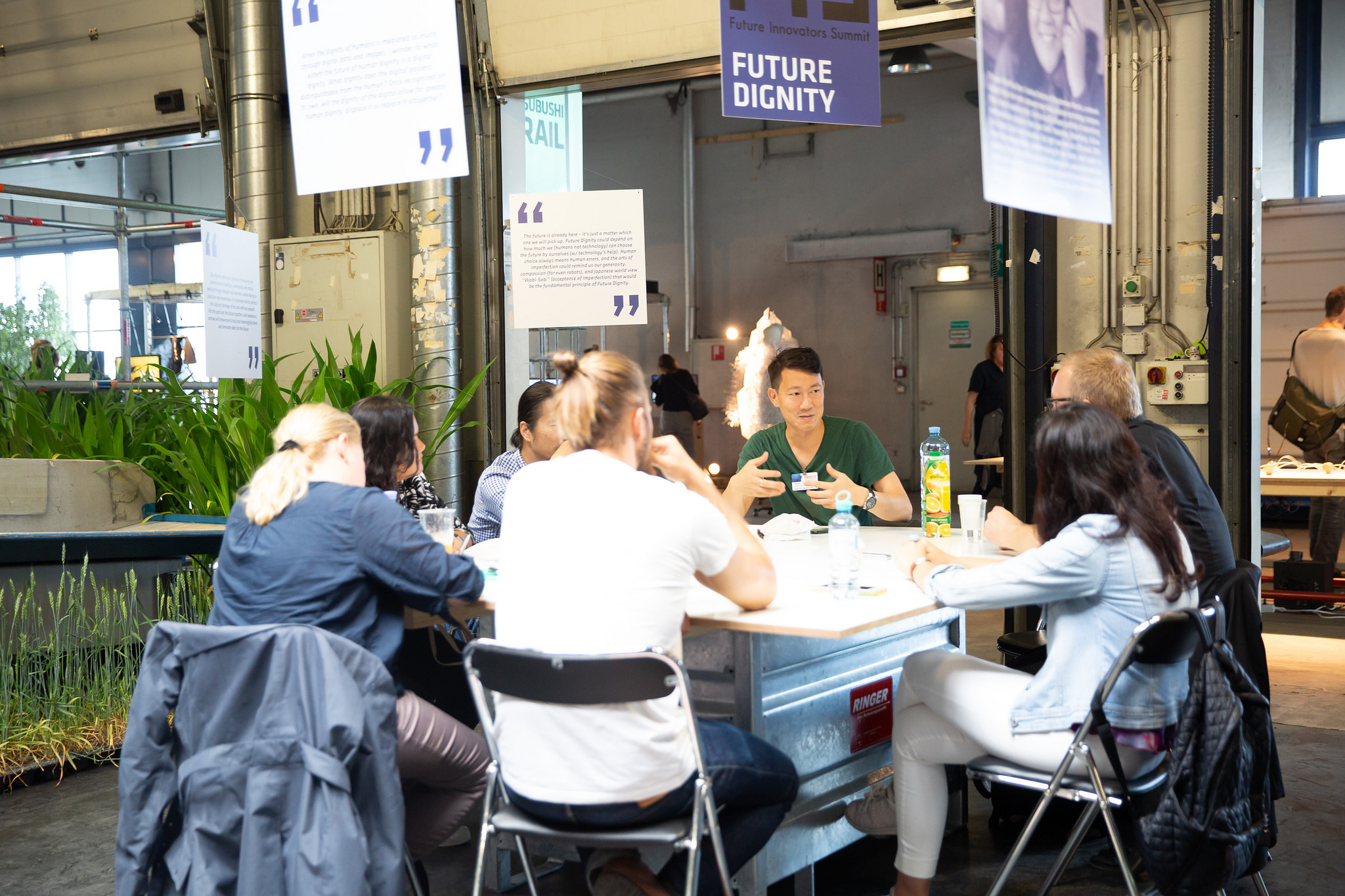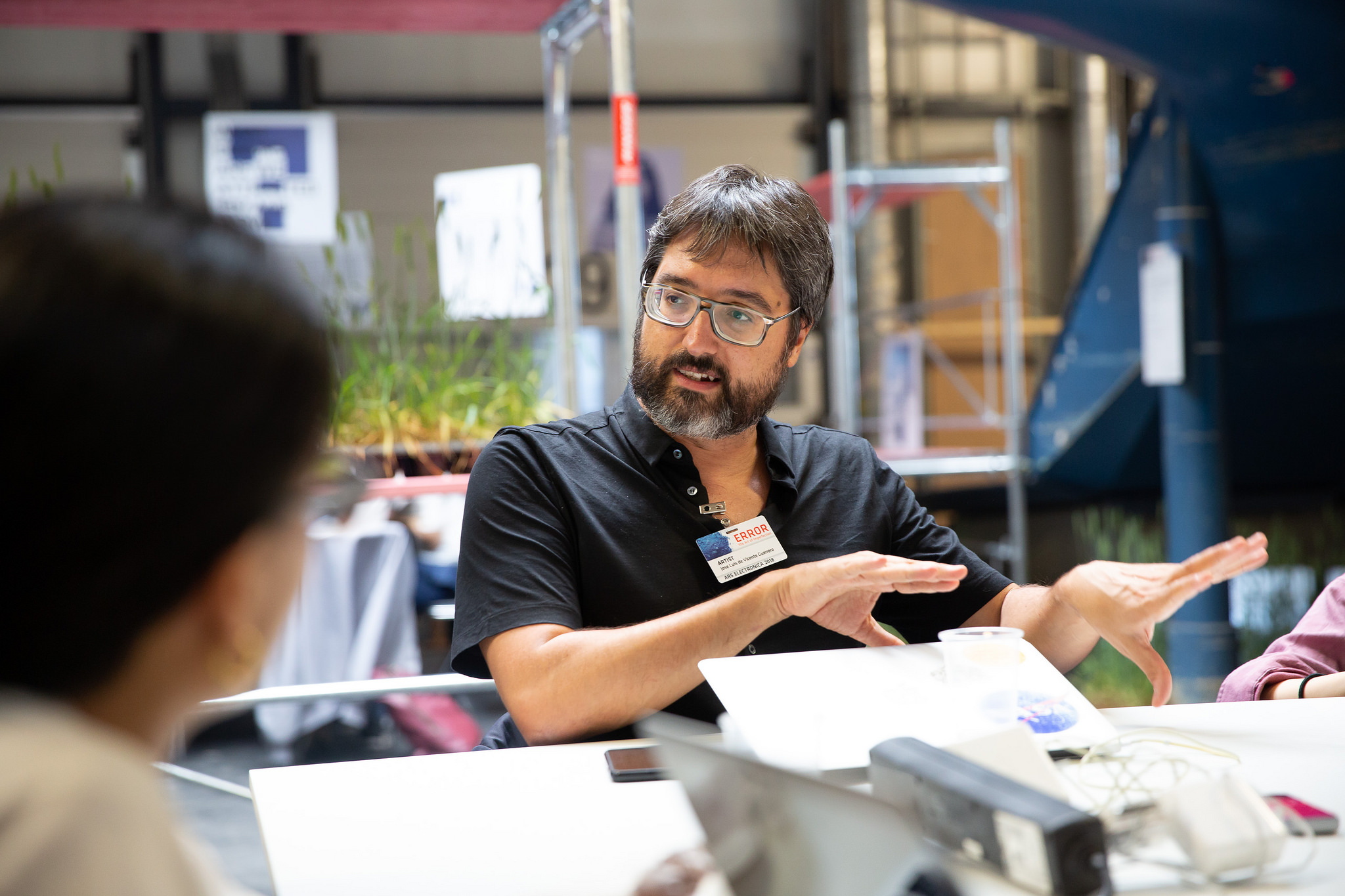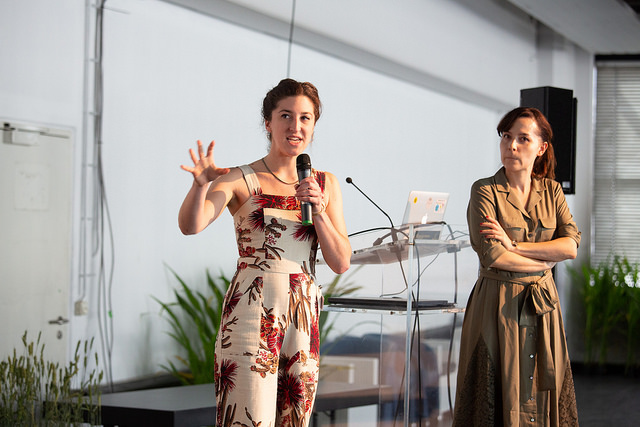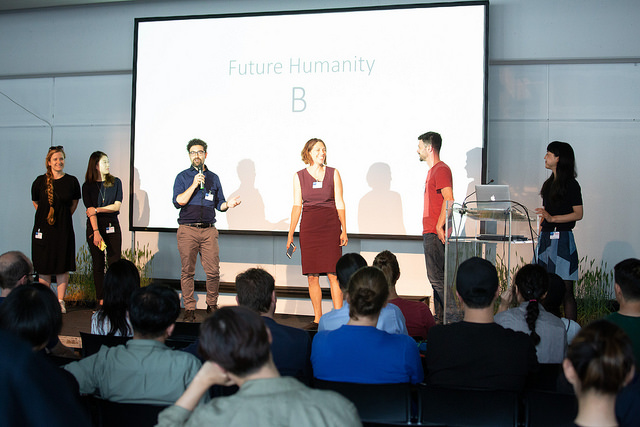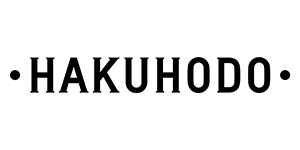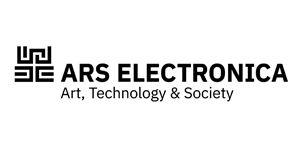at 2019 Ars Electronica Festival / September 5-9
Future Innovators Summit (FIS) is a special and comprehensive workshop format within the Ars Electronica Art Thinking School program. Future Innovators from different cultures and backgrounds and from different fields – such as artists, designers, scientists, engineers, entrepreneurs, social activists and philosophers – will gather at the Ars Electronica Festival to explore new ways of collective brainstorming on the crucial questions for humanity, and to create future scenarios.
This workshop, jointly developed by Ars Electronica Futurelab and Hakuhodo – a leading communication design firm in Japan – offers time and space to think, and aims to look for the ultimate Creative Question which will lead us to think about Missions for Tomorrow, rather than merely finding solutions for problems of today.
Under the theme of the 40th Ars Electronica Festival “Out of The Box – the Midlife Crisis of the Digital Revolution”, FIS2019 will tackle a “Box” of entrenched problems in highly digitalized society, raise questions about things that were taken for granted, and develop a scenario for a better future to free ourselves from the “Box.”
The Future Innovators, Art Thinkers, will dive deep into the following three main topics of FIS2019 at the Ars Electronica Festival:
FUTURE TRUST
Trust is a “Societal BOX” of solid belief, on which human beings have built mutual relationships even in the midst of social upheaval or technological transitions.
The digital revolution changed the way information is created, published and shared, to the point that it is undermining the legitimacy of authority and calling into question the role of media. Popularization of Fake news, Alternative facts, have seriously shaken our common ground of ‘trust for information.’ Still, people enthusiastically put sensors everywhere, monitor everything from biometric signals to political orientation, and feed digital information to AI to explain the laws governing social behavior.
Are we making society more secure, or more vulnerable? Can the data-based society generate more trust, or take us into a nightmare of mutual surveillance? Will a system like blockchain become the savior that frees us from the Blackbox, and wins back trust? Or will it end up as a tool to justify a nationwide social credit system?
How do we believe in TRUST in the 21st century?
FUTURE BODY
The body is an “Organic BOX” that confines the human mind, brain, and internal organs throughout life.
The digital revolution opened up new possibilities for transcending our physical presence, which led us to create modern technology of telecommunications or human augmentation. The evolution of biotechnology brought a whole new dimension to Life Science, blurring boundaries between natural and artificial life forms. It is altering the definition of our body, as well as our views of life and death.
When the world becomes a hybrid of organic and secondary nature, how do humans create a new culture, fashion, and lifestyles? Does our spirit still reside in our physical body? Or does it transform into a ghost freed from natural laws, and travel in space at the speed of light?
How do we find meaning in BODY in the 21st century?
FUTURE HUMANITY
Humanity is a “Philosophical BOX” which human beings have discovered in the course of history living together with nature and technology.
The digital revolution, which accelerates the technological innovations that can create alien beings such as robots and AI, now requires us to update the idea of humanity boxed in classical philosophy.
How do we see our different selves when we separate our sense of being from that of robots – Robotinity – or that of AI – The other I –? What should only humans do? What will only humans be able to do? Where does our free will go, in a fully controlled society? How will our neo-humanity evolve in the future? What will a sanctuary of the future be?
Ultimately, how can we be more HUMAN?
Future Humanity
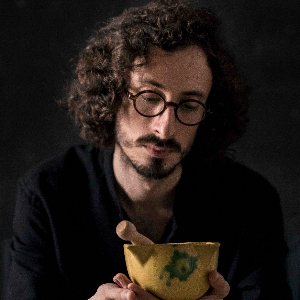
Albert Barqué-Duran (ES)
Albert Barqué-Duran is an artist and researcher, Lecturer in Creative Technologies and Digital Art at University of Lleida and Honorary Research Fellow at City, University of London. Albert earned his PhD and Postdoc in Cognitive Science from City, University of London and has been a Visiting Postgraduate Researcher at Harvard University and University of Oxford. His artwork/performances combine new media art techniques (A.I., computational creativity, data, experimental electronic music) and classical fine art methods (oil painting, sculpture) to reflect on universal topics (knowledge, culture, futures). Considered a “Culture Activist” by We Are Europe, Albert has performed at Sónar+D (Barcelona), ZKM (Karlsruhe), Creative Reactions (London), Cricoteka (Krakow), Albumarte (Rome), SciArt Center (New York) IGNITE Fest (Medellín), Mobile World Congress (Barcelona).
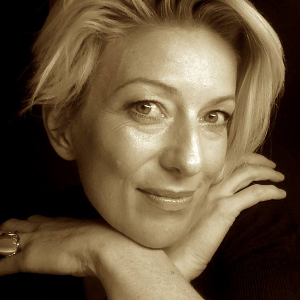
Sarah Jane Pell (AU)
Artist Astronaut Dr. Sarah Jane Pell’s experimental practice traverses from Sea to Summit to Space. A commercial diver and founder/director of the Aquabatics Research Team initiative 2002-12, she expanded creative research of human performance underwater by building extensive experience in remote isolated confined environment (ICE) operations and sea survival. Sarah attempted to summit Mt. Everest (2015) and began civilian spaceflight training (2016) to investigate ‘Performing Astronautics’. Dr. Pell collaborates with artistic, scientific and technical partners to understand and support the body and cultural expression in extreme performance. Awards include: Australia Council Fellow. Australia Council Arts Leader. Gifted Citizen – Hon. Mention. TED Fellow.
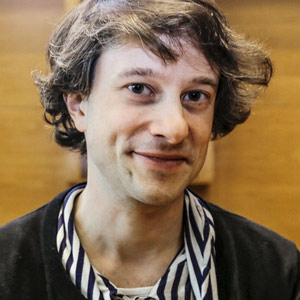
Gershon Dublon (US)
Dr. Gershon Dublon is an artist and technology researcher. Dublon invents systems that use distributed sensing and AI to extend human perception and foster new sensitivities in and of the natural world. Dublon’s works have been exhibited widely and his writings published in Presence (MIT Press), Scientific American, and many other venues. Dublon has a master’s and PhD from the MIT Media Lab, and a BS in Electrical Engineering from Yale. In 2018, Dublon co-founded slow immediate, an NYC-based creative engineering and art studio, which received the first Ars AI Lab residency. He is a research affiliate at the MIT Media Lab and a director of Living Observatory, a non-profit focused on the future of restoration science and environmental storytelling.
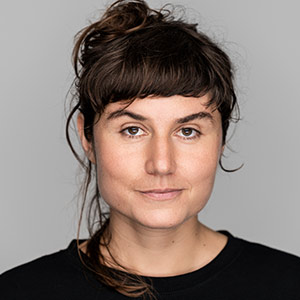
Saša Spačal (SI)
Saša Spačal is an artist working at the intersection of living systems research, contemporary and sound art. Her artistic research focuses on the development of technological interfaces and relations with organic and mineral soil agents while trying to address the posthuman situation, that involves mechanical, digital and organic logic within contemporary biopolitics and necropolitics. Her work was exhibited and performed at venues such as Ars Electronica Festival (AT), Prix Cube Exhibition (FR), Transmediale Festival (DE), Athens Digital Arts Festival (GR), Perm Museum of Contemporary Art (RUS), Onassis Cultural Center Athens (GR), Chronos Art Center (CHN), Eyebeam (USA), Cynetart Festival (DE), National Art Museum of China (CHN), Museum of Contemporary Art Metelkova (SI), Kapelica Gallery (SI), Device_art (CRO), Art Laboratory Berlin (DE), Kiblix Festival (SI), Gallery of Contemporary Art Celje (SI), Museum of Contemporary Art Vojvodina (SRB), Lisboa Soa Festival (PT), Sonica Festival (SI). She was awarded the Prix Ars Electronica Honorary Mention, nominated for the Prix Cube and the New Technological Art Award.
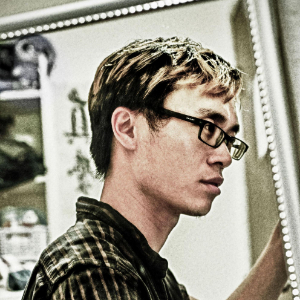
Ray LC (US)
Ray LC’s artistic and design practice incorporates cutting-edge neuroscience research for building bonds between humans and between humans and machines, showing how technological futures can embody social good. He studied AI (Cal) and neuroscience (UCLA), building interactive art in Tokyo while publishing papers on PTSD. He’s currently Visiting Professor, Northeastern University College of Art, Media, Design; and researcher, Cornell Tech. He was artist-in-residence at BankArt, 1_Wall_Tokyo, Brooklyn Fashion BFDA, Process Space LMCC, NYSCI, Saari Residence. He exhibited at Kiyoshi Saito Museum, Columbia University Macy Gallery, Java Studios, CUHK, Elektra, NYSCI, Happieee Place ArtLab. He has been awarded by Japan Society for Promotion of Science, National Science Foundation, National Institute of Health, Microsoft Imagine Cup, Adobe Design Achievement Award.
Future Trust
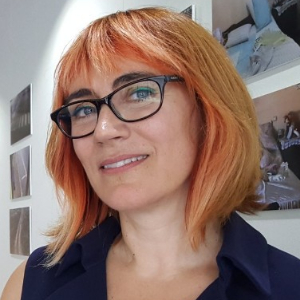
Nye Thompson (UK)
Artist turned software designer turned artist again. She has exhibited internationally, including Tate Modern, The Barbican, The V&A and ZKM. Her first solo show Backdoored.io – described by C4 News as “too shocking to broadcast” – became global clickbait and triggered an international government complaint. Media coverage includes BBC, C4, CNN, the Guardian, Wired, Neural & Studio International.
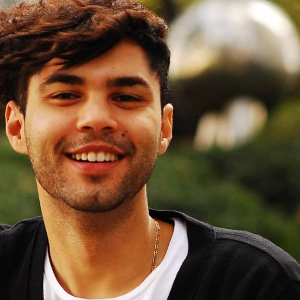
Jarrod-John Du Plooy (ZAF)
Jarrod-John is an executive producer and cultural events manager who also hosts a daily radio show at the Gwangju Foreign Language Network in South Korea. His background is in film, PR and cultural studies and has worked in New York, London and Cape Town. After completing his MBA in Cultural Content Management he now creates media contents and events regarding the role of Cultural Diplomacy as a catalyst for progress, change and education. His audio documentaries and social media activism include features on Hallyu, LGBTQIA representation, cultural diplomacy, environmental issues and HIV/Aids education in South Korea.
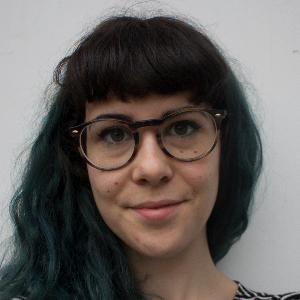
Elena Falomo (IT)
Elena is a sort of Cerberus: the heads of a designer, an engineer and an artist sharing the same body. In her practice she mix art, activism, code and physical computing to create speculative probes and hyperbolic products. Her interests include feminism, digital rights, open software and open culture and this brought her to found few artistic collectives, amongst them News World Order, Arduino Disability Orchestra and Unbias, to address pressing contemporary issues. Elena is an educator, recurrently teaching at the Royal College of Art and Imperial College London and her artworks have been exhibited in several museums across Europe.
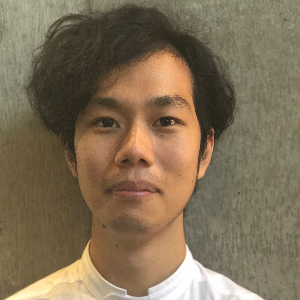
Ko Ishihara (JP)
Ko Ishihara is an artist who seeks a new shape of Dividual in the future. From the view point of the power of decentralization by internet, he tries to redefine this.
His main work is Hack, in which a user can log into another person’s account. It is an experiment to speculate what will happen to individuals whose rights are decentralized and who trust others through the system so extremely that any account can be edited by any user. His work is awarded by WIRED and Ministry of Education: WIRED Creative Hack Award 2018 Special Prize, Campus Genius Contest 2018.
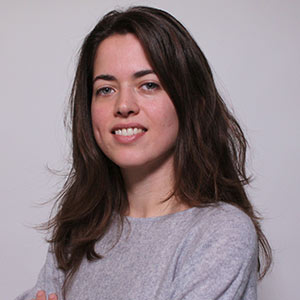
Helena Frijns (NL)
Helena is a researcher in the field of Human-Robot Interaction and currently working on her PhD at Vienna University of Technology. She is part of the Doctoral College ‘Trust in Robots’ and her topic is “Confidence in Decisions and Actions – Space as a Dimension of Trust in Social Robots”. She obtained a BSc degree in Mathematics at Utrecht University and a bachelor degree in Fine Arts at the Royal Academy of Art in The Hague, both in The Netherlands. She also graduated from the MSc Media Technology programme at Leiden University, The Netherlands.
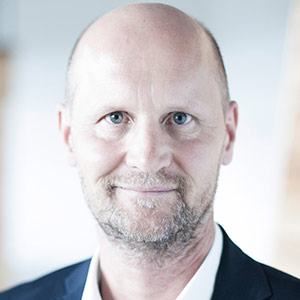
Bernhard Schambeck (DE)
Bernhard Schambeck is Head of the BMW Startup Garage, the Venture Client unit of the BMW Group. The BMW Startup Garage helps early-stage startups to succeed in this multi-trillion-dollar industry. Bernhard has successfully worked with numerous early-stage startups throughout his professional career – some of which are now leaders in their industry or even among the world’s biggest companies. His 20+ years in the automotive industry as well as his experience in working with startups and as a founder of his own company allow him to understand both sides: the corporate and startup worlds. Bernhard joined BMW in 1996 and has since worked in several positions, including as: Project Lead Electric/Electronic and Interior for the BMW X1, Head of HMI (Human Machine Interface) Team for the new MINI product line, Senior Technology Engineer at the BMW Tech Office/Palo Alto USA, Series Development Engineer Interior Components. He holds a degree in Precision Engineering and Microsystems from the University of Applied Science in Munich.
Future Body
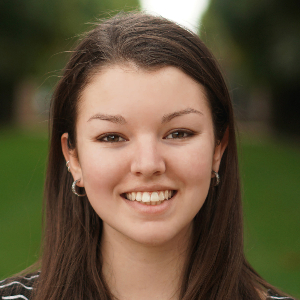
Paula Cepeda (CL)
Paula Cepeda is an Interaction Designer from Santiago, Chile. Studied Music Composition first, and specialized in sound for Film and Music Therapy. Works with smart products and wearables for the well-being and lifestyle, has participated in many contests with her projects: Among them, was finalist of Reshape 2018 and winner of IED Improving the Future 2019 with project Spur, winner of Innovative Vision 2017 and Academic Excellence award 2018 at UDD.
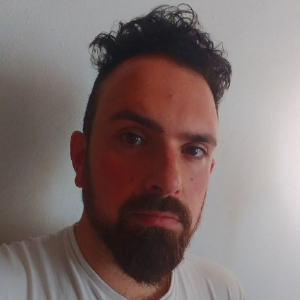
Christian Cherene (ES)
Christian Cherene is an artist and interdisciplinary researcher based between Barcelona and Belfast. He is a co-founder of art/science research collective BeAnotherLab, resident collective at Hangar which investigates identity and empathy using embodied interaction, virtual reality, storytelling and performance. His work in interactive systems is developed through collaborations at the intersection of performance art, cognitive science, immersive technology and community. He is currently Visiting Research Fellow at the Sonic Arts Research Centre at Queen’s University Belfast.
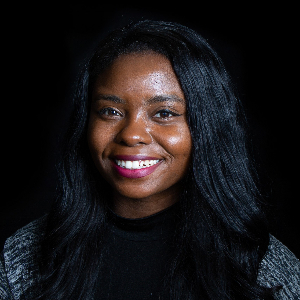
LaJuné McMillian (US)
LaJuné is a New Media Artist, and Creative Technologist creating art that integrates Performance, Virtual Reality, and Physical Computing to question our current forms of communication. LaJuné has had the opportunity to show and speak about their work at Pioneer Works, National Sawdust, Leaders in Software and Art, Creative Tech Week, and Art && Code’s Weird Reality. LaJuné was previously the Director of Skating at Figure Skating in Harlem, where they integrated STEAM and Figure Skating to teach girls of color about movement and technology. They will continue their research on Blackness, Movement, and Technology during residencies at Eyebeam, Barbarian Group, and Barnard College.

Jörg Menche (DE)
Jörg Menche is scientist and co-founder of two companies, he studied physics in Germany and Brazil, and obtained a PhD at the Max Planck Institute for Colloids and Interfaces. In 2015 he started his own research group at the CeMM Research Center for Molecular Medicine in Vienna and has meanwhile assembled an international and interdisciplinary team of 10 members with backgrounds ranging from biology and bioinformatics, to physics, mathematics, and art. Their work has been published in several science magazines and presented at over 60 invited talks, for example at the Bioethics Board for the Federal Chancellor of Austria, TEDx events, but also art exhibitions in Vienna and Munich. Recently, Menche’s team won the 2019 Falling Walls Lab Austria competition for pioneering virtual reality in medicine.
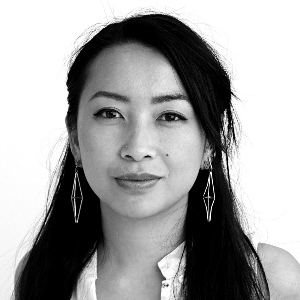
Viirj Kan (US)
Viirj Kan is an artist and engineer who builds interfaces to connect humans to a broad range of systems. Currently, she is co-founder of Primitive Labs Biodesign, a materials organization working to alleviate reliance on petrochemical plastics. Previously, she has worked on design strategy at Samsung Design Innovation Center, conducted biomaterials research at MIT Media Lab, and designed human-robot interfaces at NASA Jet Propulsion Laboratory.
Her academic publications in Human-Computer Interaction has been recognized by SXSW Festival through an Interactive Innovation Award, ACM Conference on Human Factors in Computing Systems (CHI) with Best Paper Award, honorable mentions at International Symposium on Wearable Computers and Fast Company Innovation by Design. Viirj holds degrees from Massachusetts Institute of Technology and Art Center College of Design.
Mentors
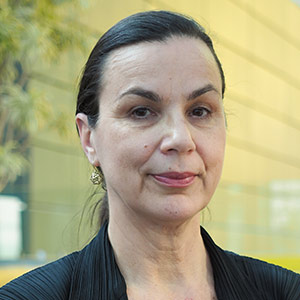
Future Humanity: Victoria Vesna (US)
Victoria Vesna (US), Ph.D., is an Artist and Professor at the UCLA Department of Design | Media Arts and Director of the Art|Sci center at the School of the Arts and California Nanosystems Institute (CNSI). With her installations she investigates how communication technologies affect collective behavior and perceptions of identity shift in relation to scientific innovation (PhD, University of Wales, 2000). Her work involves long-term collaborations with composers, nano-scientists, neuroscientists, evolutionary biologists and she brings this experience to students. She is the North American editor of AI & Society and in 2007 published an edited volume – Database Aesthetics: Art in the Age of Information Overflow and another in 2011 – Context Providers: Conditions of Meaning in Media Arts.
victoriavesna.com
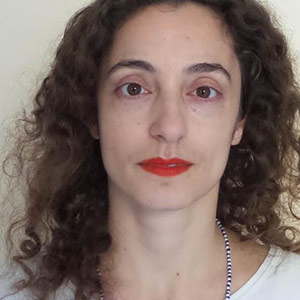
Future Trust: Irini Papadimitriou (GR)
Irini Papadimitriou is a curator, producer and cultural manager, working at the forefront of digital culture in the UK and internationally. Currently Creative Director at FutureEverything, she was previously Digital Programmes Manager at the V&A and Head of New Media Arts Development at Watermans. Her more recent exhibition, Artificially Intelligent, was on display at the V&A in 2018. She is a co-curator for the Art + Data experience at Mozilla Festival and a co-founder of Maker Assembly.
futureeverything.org
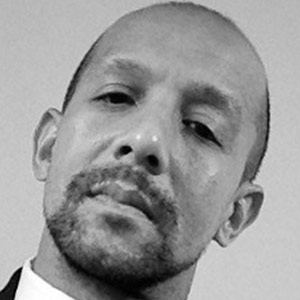
Future Body: Bradly Dunn Klerks (NL/BE)
Bradly Dunn Klerks graduated as a 3D visualising artist designer from the ArtEZ Institute of the Arts, Arnhem. Formerly positioned as CEO of Iris van Herpen. The Couture Fashion label is well known for her innovative experiments with materials, techniques and technologies. Using the interdisciplinary research and collaborations with a number of artists from various industries to create stunning work. He is responsible for all the IvH Couture shows, exhibitions and international media. His knowledge of the industry and long term relationship with several artist’s places him in a cross section between the business and the creative field that respects his vision and opinion that “the creative maker” is the centre where it all starts. Besides Ars Electronica Bradly Dunn Klerks has collaborated with diverse institutes and programs such as Future404, Premier Vision, Hyeres Festival, STARTS EU IFM x Paris, ITS Talent, and many more.
Facilitators
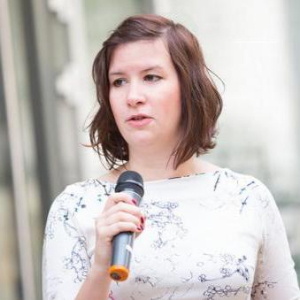
Future Humanity: Regina Sipos (HU/DE)
Regina is the Founder and Director of the Social-Digital Innovation Initiative, facilitating the cross-pollination of the worlds of open source technology and social entrepreneurship. She is also a PhD Candidate, researching social innovation in critical technical practice, with a focus on critical making in Indonesia and works as a Research Associate at the Technical University of Berlin, focusing on collaborative technology design and society, appropriate technologies and makerspaces.
She designed and managed the United Nations’ first global co-creation and incubation platform for social entrepreneurs working with technology at the International Telecommunication Union (ITU) before moving to Berlin to advise Ashoka Germany on their Digital Fellowship strategy. She is in the Steering Committee of the Centre for Internet and Human Rights at the European University Viadrina and is an Executive Board Member of the Global Innovation Gathering, a global network of grassroots innovators in technology.
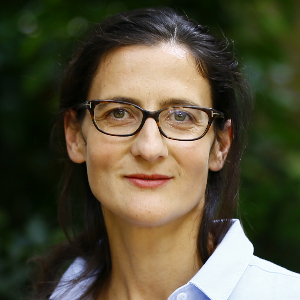
Future Trust: Maria Angerer (AT)
Maria Angerer is a Vienna-based sociologist and trend researcher. As the founder of the Institute for Participatory Social Research, her focus lies on social innovation. Her consulting firm measury supports companies that want to bring about social change. Under the direction of Prof. Peter Wippermann, she has been in charge of the German Value Index since 2008.
She studied Media Engineering and Design at the University of Applied Sciences Hagenberg and Sociology at the University of Vienna. At the heart of her work is social change: What changes shape our society and the individual? How do technological, social and cultural innovations influence each other? And what opportunities and challenges do they imply for our society – and what does it take to embrace them?
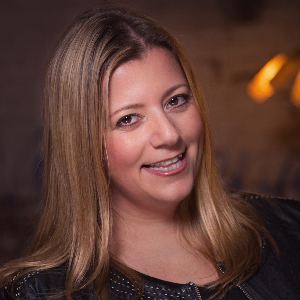
Future Body: Daniela Krautsack (AT)
Daniela Krautsack is a media strategist, urban and futurologist and start-up entrepreneur. After an MBA and a post-graduate accelerator program at THNK Amsterdam, she changed her professional focus after two decades in advertising towards urban development, participation design and cross-generational product development. As an expert with a focus on branding in public spaces, ambient media and future city design, she can look back on an international career in Vienna, London, Zurich, Mexico City, two decades as a lecturer in academic institutions, at conferences and festivals and numerous world tours. Her passion lies in creative thinking and networking with experts from science, culture and business in order to solve current problems and future challenges in cities.
PROGRAMM OVERVIEW
The basic program design looks like this and will be updated shortly:
- Day 1 (Sept. 5, 2019): Kick Off Get Together & Inspirational Opening Lectures
- Day 2 (Sept. 6, 2019): Intensive Workshop Day Part I with Mentor Lectures
- Day 3 (Sept. 7, 2019): Intensive Workshop Day Part II with Public Engagement
- Day 4 (Sept. 8, 2019): Final Presentation & Closing Event
Interested festival audience is invited join the following public FIS program:
- FRI Sept. 6, 2019, 4 PM – 6 PM: Creative Question Workshop
- SAT Sept. 7, 2019, 1 PM – 2:30 PM: Future Scenario Workshop
- SUN Sept. 8, 2019, 4:15 PM – 5:30 PM: Future Scenario Presentation
ARS ELECTRONICA ART THINKING SCHOOL
“Art is a catalyst for shaping the better future society.”
The Art Thinking School is a new festival program consisting of inspirational tours, lectures, talks, workshops and actions to invent a better future by connecting creators, industries, governments and citizens.
Every society, economy and political system contains inherent uncertainty. The fluctuating environment makes it more difficult for us to foresee the future. While the digital revolution allows us to enjoy the growing speed of communication, ways of networking and abundant information, its progress is spurring further innovation in cutting-edge technologies such as biotech, nanotech, robotics and artificial intelligence (AI) at an unprecedented rate. It is becoming urgent for humankind – as the user, as recipient or developer – to find ways of attaining the skills and sensitivities to create dialog with these emerging technologies.
There have been various efforts to define the problems that need to be addressed in order to achieve better relationships between humans and technologies, and to devise a sustainable solution that can reconcile existing technical, financial and social constraints. Whereas most approaches start by identifying the scope of the issues based on certain assumptions, we have to maintain objective views that can challenge the underlying assumptions themselves, assumptions that precede the emergence of new technology. Art Thinking suggests this in order to deepen the understanding of current society per se, to recapture it on our canvas observed from multiple aspects that enable us to discover the underlying principles within all the complexity. It focuses on unearthing and exposing fundamental questions (the “creative questions”), rather than seeking creative solutions. A good question evokes various responses, and it will increase our awareness of the different angles from which to see the future. In this sense, Art Thinking makes us more flexible in the face of future uncertainties, more resilient and prepared for contingency.
We are initiating Art Thinking School as a platform to exchange a creative mindset of questioning to the world. In the same way as designers design solutions by attempting to define problems and realize creative ideas, artists question existing beliefs by demonstrating messages through their creative work. As a problem solving method, design thinking is highly diffuse, whereas Art Thinking is an attitude of cultivating a creative mind to cast doubt on common perceptions and help people, from industries to governments, to develop an inspiring message that can catalyze positive reactions from social participants.
The Future Innovators Summit is the most important and representative part of the whole Art Thinking School program at the Ars Electronica Festival, which will be announced few weeks before the festival.
